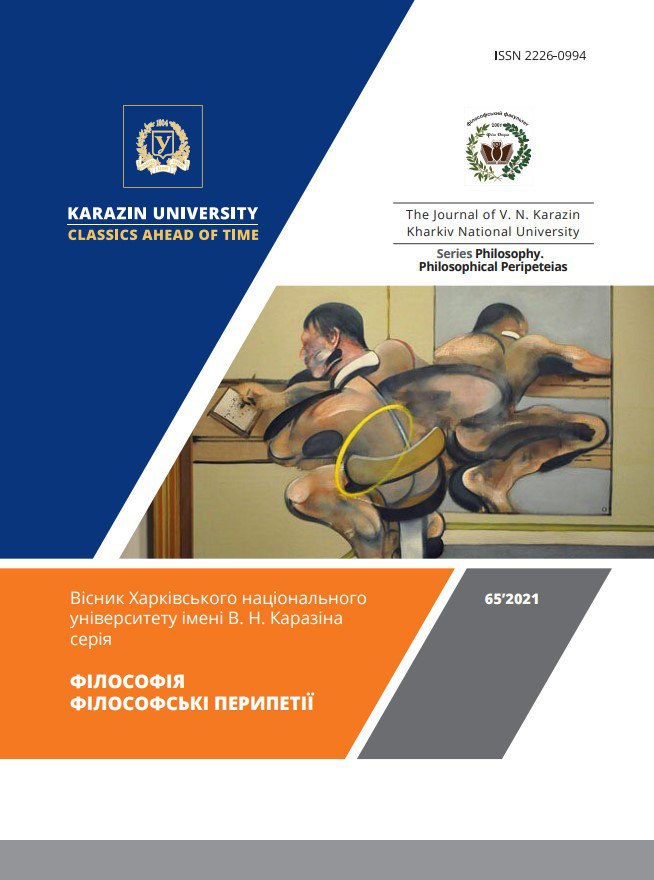THE ROLE OF POLITICAL ADVERTISING IN COMMUNICATIVE ACTIVITIES AS A FACTOR IN THE FORMATION OF IMAGES OF THE LEADER
Abstract
The article defines the formation of images of the leader through political advertising, analyzes the concepts of "communication", "leader", "social demand", "political advertising", explores the role of social demand for leaders, information factors in the formation of images of the leader. The peculiarities of the formation of the image of a leader in advertising, in particular political, in the process of communicative activity, the essence of the concept of leadership, and ways of its formation are highlighted. The principle of the emergence of a social demand for leadership, the preconditions and consequences of the actions of political advertising in society are studied. Taking into account the qualitative characteristics of society, the attitude of the public to social change, to the leadership of individuals, ways of interacting with each other is determined.
The relevance of the article is determined by modern realities in terms of active informatization, politics, socialization and "digitalization" of society in a democracy. The interdependence of society and government, the principles of public formation of politicians, and the effectiveness of their existence in the communicative space, the role of image strategies, political advertising technologies, tasks, components and features of political advertising, other factors influencing the formation of political leader.
Understanding political and social advertising in the context of communicative activities provides an understanding of modern social communication processes. Due to social processes, they become more and more complex every year, as new tools of advertising influence and new barriers to the trust of the target audience appear. In particular, voters have their own habits of determining sympathy for certain parties or political leaders, which are difficult to change. However, the rational formation of images of elites makes it possible to form the right messages for society.
The problem is that the effectiveness of methods of forming the image of a leader depends on the chosen strategy and characteristics of certain parts of society. Studies of the peculiarities of society, their characteristics and social demands allow you to effectively manage the process of becoming a leader. Given the changing social dynamics of society, in the article we also showed that some leaders no longer meet modern requirements, and then they are replaced by others. The article analyzes the system of counteractions, as a result of which the social dynamics of change of leaders in society is possible.
Downloads
References
Akaymova A. (2012). Politichna reklama yak proces komunikaciyi. Zhurnal Verhovnoyi Radi Ukrayini. Viche. http://webcache.googleusercontent.com/search?q=cache:SU6WILMUMMoJ: veche.kiev.ua/journal/2468/+&cd=1&hl=ru&ct=clnk&gl=ua (in Ukrainian)
Felzer A. B., Dobronevskii V. (2012). Tehnika roboti kerivnika. Visha shkola. (in Ukrainian)
Filosofskij enciklopedichnij slovnik. (2002). Abris. (in Ukrainian)
Guricka M. S. (2013). Politichna reklama yak nevid’yemna skladova viborchogo procesu. Politologichni zapiski. (7). http://nbuv.gov.ua/UJRN/Polzap_2013_7_24 (in Ukrainian)
Lukashevich V. V. (2007). Osnovy upravleniya personalom. KNORUS. (in Ukrainian)
Northouse P.G. (2018). Leadership: Theory and practice. Thousand Oaks, CA: Sage.
Selchenok. K. V. (2004). Psihologiya liderstva. Harvest. (in Ukrainian)
Shportko O. (2007). Osoblivosti politichnoyi reklami yak elementa komunikativnogo procesu. Politichnij menedzhment. (6). (pp. 98). (in Ukrainian)
Sidorenko O. S. (2013). Sutnist i struktura komunikativnoyi diyalnosti u procesi pidgotovki majbutnih socialnih pedagogiv. Teoretiko-metodichni problemi vihovannya ditej ta uchnivskoyi molodi. 17 (2) (pp 264-273). http://nbuv.gov.ua/UJRN/Tmpvd_2013_17%282%29__31 (in Ukrainian)
Suraj I. G. (2009). Publichna sluzhba – vazhliva skladova upravlinnya spravami suspilstva. Derzhavna sluzhba v Ukrayini v istorichnomu konteksti: problemi stanovlennya ta rozvitku. 2(2). (pp. 34-36). (in Ukrainian)
Tolkovanov V. V. (2013). Upravlinske liderstvo: monografia. PP Melnik A. A. (in Ukrainian)
Zayarna, O. (1999). Yak perekonati masovu auditoriyu: Psihologichni chinniki efektivnosti propagandi. Nova Politika , (1) , (pp. 28–31). (in Ukrainian)
Copyright (c) 2021 Віталій Коваль

This work is licensed under a Creative Commons Attribution 4.0 International License.
Authors who publish with this journal agree to the following terms:
- Authors retain copyright and grant the journal right of first publication of this work under the terms of a license Creative Commons Attribution License 4.0 International (CC BY 4.0).
- Authors are able to enter into separate, additional contractual arrangements for the non-exclusive distribution of the journal's published version of the work (e.g., post it to an institutional repository or publish it in a book), with an acknowledgement of its initial publication in this journal.
- Authors are permitted and encouraged to post their work online (e.g., in institutional repositories or on their website) prior to and during the submission process, as it can lead to productive exchanges, as well as earlier and greater citation of published work.






3.gif)




